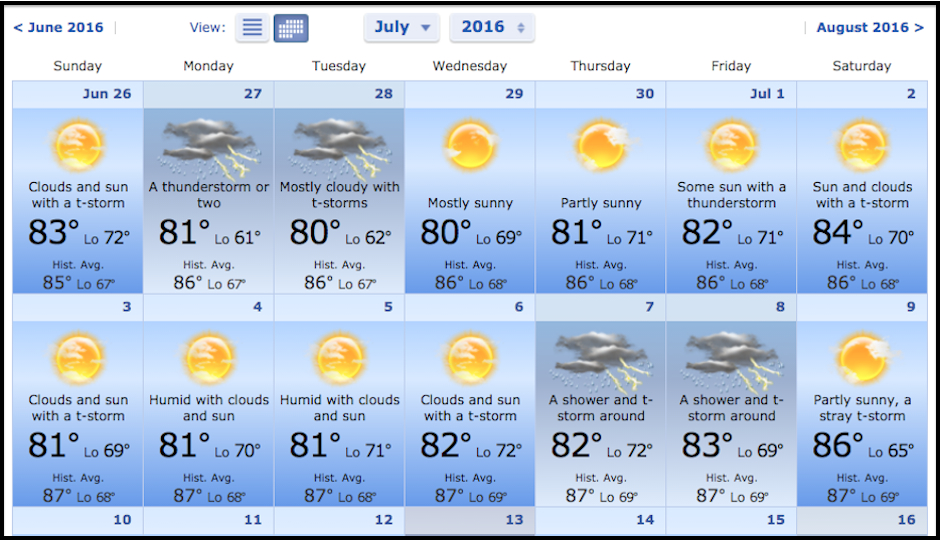AccuWeather Claims It Can Predict What the Weather Will Be 90 Days from Now

AccuWeather says it won’t rain on the Fourth of July. (Screenshot from AccuWeather.com)
Each year, as winter approaches, we have a bit of fun when the local weather folks deliver their long-range winter outlooks, attempting to tell us that they have a clue what kind of weather we’ll be experiencing by the time we get to February. But those reports are nothing compared a new service being offered by AccuWeather, the 54-year-old State College-based weather forecasting company that’s used by Channel 6 and countless other outlets across the country.
While our local meteorologists’ longer-term predictions are filled with vagueness, generalities, wide margins, and repeated disclaimers — There’s always a possibility for a change in the forecast, especially this far out, but right now, we think that Philadelphia will see anywhere between 12 and 38 inches this winter, and it will be colder than normal — the AccuWeather 90-day forecast is downright specific.
It’s thanks to this specificity that we can tell you that rain won’t ruin your Fourth of July here in Philadelphia. According to AccuWeather, Philadelphia will be sunny and humid, with a high of 81 degrees. Not a cloud in the sky. But watch out, because there will be thunderstorms later that week and over the weekend. So much for the family reunion in Fairmount Park. Hope you didn’t already order the t-shirts.
“It’s ridiculous,” says former TV meteorologist John Bolaris, who now splits his time between providing forecasts for Metro publications and selling real estate. “AccuWeather is undeniably the hugest weather brand by far in the United States. But this has no rhyme or reason. I’m skeptical of any long-ranges, because our climate is changing and the computers and data have not caught up yet.”
Gawker Media-owned tech site Gizmodo blasted the new AccuWeather 90-day forecasts in an article on Wednesday, calling the service “misleading as hell” and “nonsense.”
AccuWeather received similar backlash in 2013, when the company started doing 45-day forecasts. Washington Post weather editor Jason Samenow declared those forecasts “a joke.” Now they have (literally) doubled down.
“We are a scientific company, and anything we do has a scientific basis,” says Jon Porter, AccuWeather’s vice-president of innovation and development, who claims that some 1.5 billion people around the world get an AccuWeather forecast on any given day. While some weather forecasting companies do offer statistics illustrating their accuracy, Porter explains that AccuWeather does not make this information publicly available.
“We looked at the traffic on our 45-day product and we saw that interest has continued to build on that,” says Porter. “And we’ve always been responsive to our users’ needs and user interest. Our users recognize that forecasts are going to change as you get closer to a particular event, so we suggest that they check back in and look at how the forecast is evolving. They know there’s a big difference between a two- or three-day forecast and an extended forecast.”
Part of what AccuWeather uses to arrive at the 90-day forecast is historical weather data. “But there’s no way you can look at that and say, Well, we shouldn’t have our wedding on July 8th in Stone Harbor,” insists Bolaris. “It’s not reliable information.”
But, as Samenow pointed out in his 2013 article, that’s just what AccuWeather has implied. Here’s what the company wrote in a blog post after the 45-day forecast feature was released:
If the 45-Day Forecast shows an expected high of 85 degrees and sunshine for Labor Day, the normal high for the date is 80 degrees and the record high for the date is 98 degrees, a lot of information can be gathered. Conclusions such as “an outdoor BBQ or swimming should be fair game” can be made.
Or, if you are planning a tailgate for a college football game and the 45-Day Forecast shows a trend of below-normal temperatures and rain on the date, you might want to plan ahead and invest in a canopy and heaters.
Granted, AccuWeather admitted in that post that “people should not use long-range forecasts as a strict guide,” and Porter said the same, but when you go to the new 90-day forecasts and click on a given date, no such disclaimer is given.
“It’s so insane, I haven’t even bothered learning about it,” says amateur weather forecaster and WXPN producer Robert Drake. “I already use the Drakecast, my own 90-day outlook formula. In 90 days, I can guarantee that I will be complaining about the heat and humidity and remembering those good ol’ days when we used to have four seasons here in Philly. Oh, and the city will most definitely stink more.”
Porter tells us that AccuWeather is used to such criticisms.
“We’ve been around for 54 years,” he says. “When you’re the leader and you’re constantly innovating products, that type of criticism can occur. People used to criticize us for issuing five-day and seven-day forecasts. And when the radar maps became available, they said, You can’t release that. No one will know what it means, all the colors. Now, everyone uses radar on their smartphones. We feel strongly that the weather information that we have ought to be available to people.”
Follow @VictorFiorillo on Twitter.


